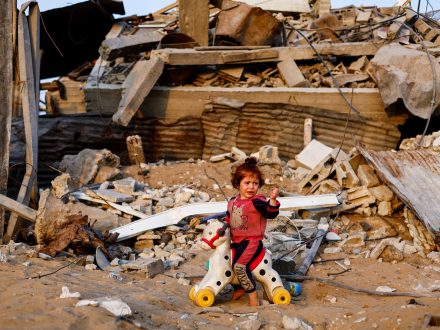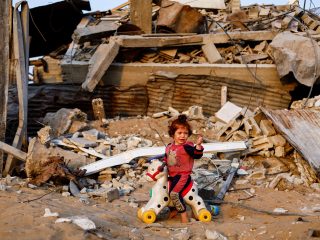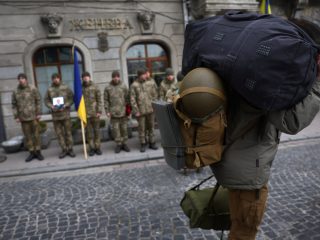JERUSALEM — Israel’s president and senior military officials on Wednesday condemned attacks by Jewish settlers on Palestinians in the West Bank, calling for an end to a growing wave of settler violence in the occupied territory.
President Isaac Herzog described the incidents as “shocking and serious,” adding a rare and forceful public rebuke from a largely ceremonial office that is meant to serve as a moral compass. He said violence by a “handful” of perpetrators “crosses a red line” and urged in a social media post that “all state authorities must act decisively to eradicate the phenomenon.”
Herzog’s comments, echoed by two high-ranking military leaders, followed a Tuesday incident in which dozens of masked settlers attacked the Palestinian villages of Beit Lid and Deir Sharaf, setting fire to vehicles and property before clashing with Israeli soldiers.
In other developments Wednesday:
– Israel reopened the Zikim crossing into northern Gaza after keeping it closed for two months. The U.N. welcomed the move but has said Israel has been too slow to surge humanitarian aid since a cease-fire began last month. Aid has been entering Gaza since Oct. 10 through two crossings in southern and central Gaza.
– The Israeli military said it killed four armed militants who posed an “immediate threat” in southern Gaza areas under its control. In Khan Younis, one person was killed while approaching Israeli troops across the so-called yellow line. In Rafah, three people were killed while troops worked to destroy underground tunnels.
Military leaders react to settler violence in the West Bank
Army Chief of Staff Eyal Zamir echoed Herzog, saying the military “will not tolerate the phenomena of a minority of criminals who tarnish a law-abiding public.” He said the army is committed to stopping violent acts by settlers, calling them contrary to Israeli values and harmful because they “divert the attention of our forces from fulfilling their mission.”
Maj. Gen. Avi Bluth, head of the military’s Central Command, said confronting an “anarchist fringe” consumes significant resources that could otherwise be used for security and counterterrorism operations.
The army said settlers who attacked the villages fled to a nearby industrial zone and then attacked soldiers responding to the incidents, damaging a military vehicle. Police reported four Israelis were arrested; the military said four Palestinians were wounded. On Wednesday, police said three of the suspects were released and one, a minor arrested on suspicion of arson and assault, will remain in custody for six more days. Police added that investigations into the released suspects continue “with the goal of bringing offenders to justice, regardless of their background.”
Settler violence has surged
Tuesday’s attack is the latest in a series of assaults by young settlers that have increased since the Gaza war began two years ago, and which have intensified in recent weeks during the olive harvest. The U.N. humanitarian office reported that there were more Israeli settler attacks on Palestinians in the West Bank in October than in any other month since tracking began in 2006, with more than 260 incidents.
Palestinians and rights groups accuse the Israeli army and police of failing to stop settler attacks. They point to a government dominated by far-right figures who support the settler movement, including Finance Minister Bezalel Smotrich, who shapes settlement policy, and Interior and National Security Minister Itamar Ben-Gvir, who oversees the police.
Muayyad Shaaban, who heads a Palestinian Authority office tracking the violence, said settlers set fire to four dairy trucks, farmland, tin shacks and tents belonging to a Bedouin community. He described the attacks as part of a campaign to drive Palestinians from their land and accused Israel of providing settlers with protection and immunity, calling for sanctions against groups that “sponsor and support the colonial settlement terrorism project.”
Palestinians react angrily
In Beit Lid, residents said they will not accept living in fear. Mahmoud Edeis said the violence undermines his family’s right to safety: “To feel that my children are safe… But at any moment something could happen … This can’t go on.”
Amjad Amer Al-Juneidi, who works at a dairy factory that was attacked, described the assault as organized, with attackers carrying gasoline cans, prying open a factory door with a crowbar and then igniting the fuel. “Their entry into the company wasn’t random. It was organized, and they had a fully organized tactic for how to carry out the burning,” he said.
UN officials say more aid is needed in Gaza
U.N. officials welcomed the reopening of the Zikim crossing but reiterated criticism of Israel for not allowing larger and faster deliveries. U.N. spokesperson Stephane Dujarric said humanitarian groups in Gaza face challenges distributing food once it arrives and are having to “stretch out the available stocks.”
UNICEF warned that demand for baby formula far exceeds current supplies, and its spokesperson Ricardo Pires said there are concerns about whether there will be enough syringes for a vaccination campaign that began this month and continues into January. He warned of possible supply problems starting next month if Israel does not allow greater shipments.
COGAT, the Israeli agency responsible for coordinating humanitarian aid into Gaza, said in a statement Tuesday that “Israel is fully committed to its obligation to facilitate the entry of humanitarian aid trucks in accordance with the (ceasefire) agreement.”



